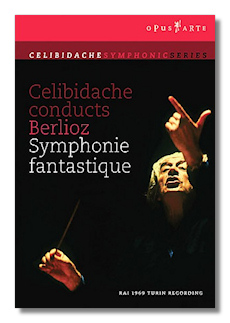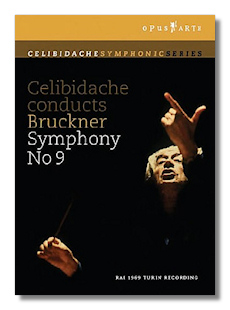
The Internet's Premier Classical Music Source
Related Links
-
Berlioz Reviews
Bruckner Reviews - Latest Reviews
- More Reviews
-
By Composer
-
Collections
DVD & Blu-ray
Books
Concert Reviews
Articles/Interviews
Software
Audio
Search Amazon
Recommended Links
Site News
 DVD Review
DVD Review
Symphonies on DVD

Hector Berlioz
Symphonie fantastique
Orchestra Sinfonica di Torino della RAI/Sergiu Celibidache
Opus Arte OA0977D DVD 58min Full Screen LPCM Mono


Anton Bruckner
Symphony #9 in D minor
Orchestra Sinfonica di Torino della RAI/Sergiu Celibidache
Opus Arte OA0976D DVD 62min Full Screen LPCM Mono Rec. 1969
Romanian cult conductor Sergiu Celibidache (1912-1996) was famously opposed to recordings because he believed that they were a falsification of music-making. That any of his work exists on CD at all is thanks largely to his family, who realized that they had almost no control over unauthorized live recordings. As a result, they consented (somewhat reluctantly, one gathers) to let live recordings, mostly from the last 10 or 15 years of the conductor's life, be released by labels such as Deutsche Grammophon and EMI, who at least would make sure that the job was done with all appropriate care.
Even less of Celibidache on video exists. A very few performances were recorded for television. The two reviewed here were recorded for Italian television (RAI) in the 1960s. At the time, Celibidache was principal conductor of the Swedish Radio Symphony Orchestra. I don't know if he had a position with the Orchestra Sinfonica di Torino della RAI as a guest conductor, or if he had a less formal relationship with the orchestra at that time.
The Berlioz was recorded in or around 1969 (good luck finding an actual date anywhere in the accompanying booklet!), apparently to tape, not to film, judging by the cool clarity of the images. It is particularly lucky that this video was available for reissue, because this symphony is not represented in the CDs released by DG and EMI.
Celibidache's later performances could be iconoclastic – his tempos tended to get slower and slower as he aged – but few people hearing this Symphonie fantastique would find a reason to raise their eyebrows. Although the tempos are mostly slow, they are not freakish, and they always help to illuminate the music rather than impede it. The very opening of the symphony, for example, broods to magical effect, and the "Scène aux champs" (19:06 here) definitely adds a generous tablespoon of foreboding to the pastoral setting. The "Marche au supplice" regains its power to frighten here. Too many performances treat this movement as an opportunity for the orchestra to flex its muscles ("Look at me!"). Celibidache doesn't allow this, and for once, we find ourselves nervously holding our heads as the movement reaches its ghoulishly ceremonial close. The finale, while atmospheric, is not drowned in effects. (The bells are not very imposing, however.)
The Italian orchestra is not a top-rank ensemble, but mostly because it lacks a good, rich string sound, not because the players lack ability. In fact, the wind solos are consistently excellent, and no one in the ensemble need feel ashamed of the work that they did that evening. None of the musicians looks particularly excited, though.
As suggested above, the picture, although it is black and white, is very good, and the cameras generally are where one would want them to be. There's not a lot of imagination in how this performance was shot, but that's alright. At least we get to see a lot of the conductor, looking handsome and serious, and beating a clear beat throughout. The monaural sound is not bad either. I don't know that the average listener needs this DVD, but I don't think any of Celibidache's admirers will be disappointed by it.
Like the Berlioz, the Bruckner also seems to have been recorded in 1969. There are at least two stereo Bruckner 9's with Celibidache on CD, however, so the preservation and perpetuation of this artifact hardly seems as crucial.
To be brief about it, this performance is what is known as a nice try. The orchestra hardly seems to be up to the music's demands. It's not just that there are blown notes and occasional mistakes. This is a live performance, after all, and not even the members of the Chicago Symphony Orchestra are expected to be perfect. The problem is the general raggedness of the ensemble, a weakness of the strings, and the palpable sensation that the Orchestra Sinfonica di Torino della RAI is out of its depth. The performance is worthwhile, and this music, even when shoddily played, is glorious, but one needs to be a dedicated Celibidache fan to want to see this DVD more than once. The conductor looks exhausted at the end, as if he has just run the gauntlet. In a very real sense, he has. (I will say, however, that the Maestro's fabulous mane of hair is almost worth the price of the CD!)
To add insult to injury, the camera-work is pretty bad this time around. Jerky, aimless pans suggest that the director was only barely familiar with Bruckner's score. When the camera is in the right place, sometimes it's in the right place with a vengeance. In the Scherzo, there's a comical lightning zoom to the timpanist as he softly beats out the movement's insistent rhythm. When that same passage reappears in the da capo, the same camera "gesture" is repeated. Howls of laughter! On the other hand, we don't get to see nearly enough of Celibidache on this DVD. Also, the camera lenses distort the perspective; this is particularly noticeable in overhead shots and in long pans. At least the sound is alright, albeit monaural.
Copyright © 2007, Raymond Tuttle




















